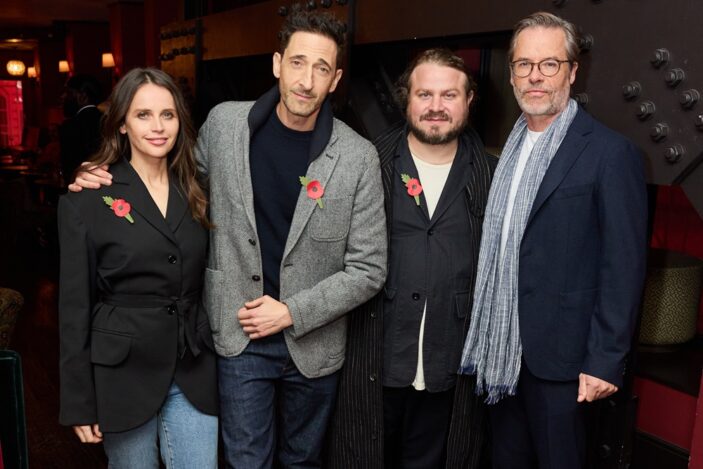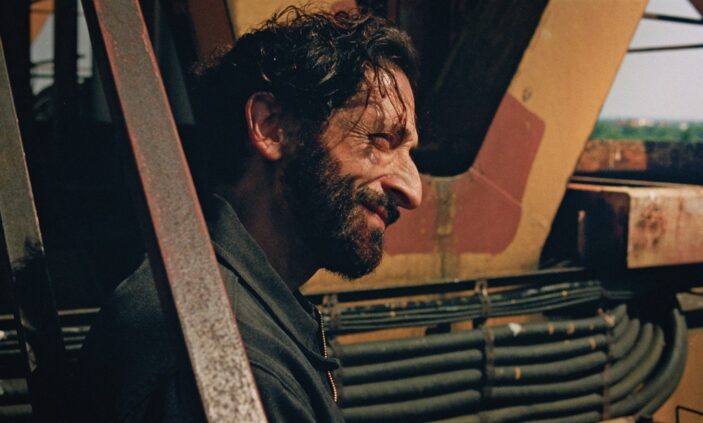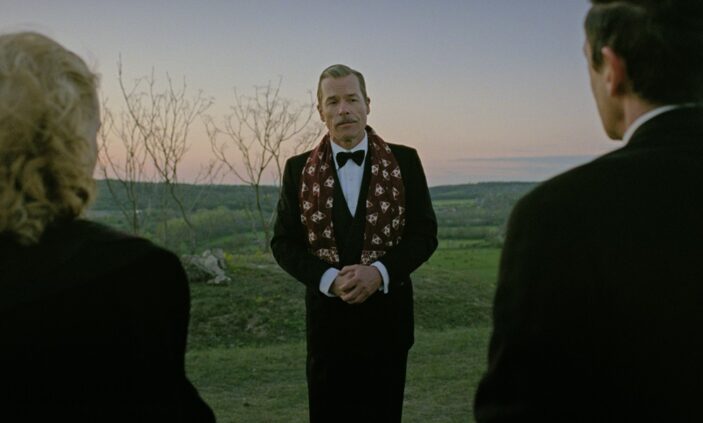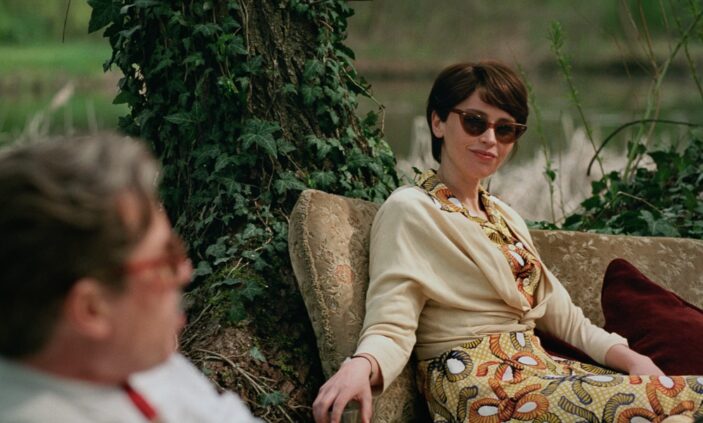
Escaping post-war Europe, visionary architect László Toth (Adrien Brody) arrives in America to rebuild his life, his work, and his marriage to his wife Erzsébet (Felicity Jones) after being forced apart during wartime by shifting borders and regimes. On his own in a strange new country, László settles in Pennsylvania, where the wealthy and prominent industrialist Harrison Lee Van Buren (Guy Pearce) recognises his talent for building. But power and legacy come at a heavy cost…
Recipient of the prestigious Silver Lion Award for Brady Corbet’s marvellous direction at the 2024 Venice Film Festival and a Golden Globe award for Best Motion Picture (Drama), this structurally beautiful and grandiose epic is suffused with Adrien Brody’s soulful award-winning performance. With ambitious scope and a profound exploration of historical and personal themes – and shot on rarely seen 70mm film stock – The Brutalist is a towering tribute to the immigrant experience.
As the film continues to sweep the award season, ahead of its Australian theatrical release (you can read our review here), Peter Gray was fortunate enough to speak with Brody, Pearce and Jones about their individual characters, the film’s themes and how it reflects their artistic journey, and the dynamic of power and they navigated such.
Adrien, the film explores themes of legacy and ambition within the framework of architecture, and I wanted to know how do you see your character’s pursuit of art and creation reflect your own artistic journey?
Adrien Brody: That’s an interesting question, and I very much relate to it. First of all, I preface that with what I’ve always found so beautiful and important about working in film is the permanence of film, and how it is leaving something beyond your time. If we look back at great performances and great, beautifully crafted films of other eras, they speak to those other times of a style of work that were contributed to by other artistic people. And if they’re meaningful, they live on beyond our years. I think that is what artists yearn for. To leave works that are representative of a greater significance and journey. And that’s always been my yearning. Not to entertain or leave something that is just work that enables me to do more work. It’s to find things of some significance that speak to me. That speak to the human condition. That touches on socially relevant issues. And films like (The Brutalist) are quite groundbreaking in the space, so it’s very relatable. I am also the son of an artist. My mother’s a photographer and a well respected artist, and there are many parallels within the story that speak to me, including her yearning to leave behind a body of work with her imagery and what those speak to. It’s between her influences and the many influences of all the wonderful filmmakers I’ve worked with and the journeymen actors I’ve collaborated with that, I think, we share this similar yearning.

And László Tóth as a character is a very complicated man, one with as many faults as talents. Was there a process for you in “finding” him? Do you need to like a character in order to play him?
Adrien Brody: That’s a great question. I think you can’t approach a character, ever, with judgement. I don’t know if you need to like him 100%, because certain people don’t like themselves enough. And that may be an attribute of the character that you’d want to depict and embrace, but it’s a good lesson overall to not approach (characters) with a sense of judgement or preconceived ideas. But I do like him. I do love his flaws and his humanity and that frailty that exists. He’s very human. And, in spite of the flaws and imperfections, he’s likeable and is someone that is relatable, and that’s the kind of characters I yearn to find. (People) that are so complex and representative of how complex we all are as a society, that you can make great contributions to this work and have certain failings, and you can be unpleasant at times and be completely endearing, and sensitive to others in other times. I think that’s the beauty of the writing and the storytelling in this film. That it speaks to not overly refining a character so that you are encouraged to like him. You have to discern that on your own and he has to earn that, in a way. And that’s so special.
The film examines the dynamic of power and control, and I want to ask both of you, Felicity and Guy, how did you approach portraying characters who are likely sort of both a product and a contributor to these dynamics?
Felicity Jones: Yeah, that’s very true. I feel as though power is a huge theme of the film, and who is able to have power over who. In many ways, (Guy’s character) feels that he has absolute power, because of his economic status. Particularly in our scene together, where we have our spat, so to speak, that part of the scene is Erzsébet reclaiming her power and dignity, and telling him that power actually comes from integrity and treatment of others. But then there’s the dynamic on the other hand, with László and Erzsébet, which is, again, a power dynamic. They’re both very ambitious individuals, and it’s interesting exploring that Erzsébet is the one who takes the low road, so to speak, and the less intellectually stimulating job, in some respects, to support her husband. How often would that happen the other way around? So it is exploring, even within their relationship, the dynamic between professional success and gender.

Guy Pearce: And I feel like power for Van Buren is something that feels really constructed for him. I feel like, on some level, what I read of this character when I read the script was he actually feels powerless, and that trying to cultivate power for himself is a must. That’s how he will get himself out of whatever it was he was in. Whether that was he didn’t have enough money or didn’t feel like he had enough control. When we meet him, we find a man who is seemingly powerful, but, funnily enough, he’s a bit out of control and angry. That’s not to say he doesn’t have power, but it’s what he does with that power that I think says a lot about him. Power is an interesting quality, isn’t it? I think on some level, he’s envious of László, because Adrien’s character feels like he has more of a sense of himself, and has so much power within himself that Van Buren doesn’t have. So who is the more powerful character?
He exhibits different facets of his character, depending on who he’s with. Do you think there’s a characteristic that’s the truest form of Van Buren?
Guy Pearce: I think he’s aware of how to get things from people. He’s aware of how to manipulate and, to a degree, all of that is (him), but I think the most truthful version of him is when he’s out of control and angry. I think he’s an unhappy man and that is what he’s trying to escape from. So by constructing his life around him and being in control of the things around him, he gets to avoid being that guy we see in his opening scene, who’s not in control. If you were to put him on a scale, the not-in-control version is probably the truest version of him.

Felicity, how do you portray a love that exists as an idealized obsession for László? We see this version of you in his head before you appear, is there a difference in that between what you actualize when you arrive physically?
Felicity Jones: What I liked about the script was that, yes, there is this immense weight for these characters to be united. There’s this eight years that they haven’t seen each other, so the romance is amped up. But what was wonderful is how quite complex it is for them. It’s quite hard for them in those very intimate scenes to rediscover each other. There’s a certain amount of awkwardness, actually. You know, when László comes in and sees Erzsébet in the bath, he’s a little bit flummoxed. Even though it’s his wife, they just haven’t had this level of closeness. In those scenes, you see them working out this intimacy. There’s a willingness in Erzsébet, She has such belief. It’s almost like this relationship has become her faith. It’s her God in some ways. And you can see her determination to make that relationship work, whatever that entails. Maybe to her own detriment.
The Brutalist is screening in Australian theatres from January 23rd, 2025.
